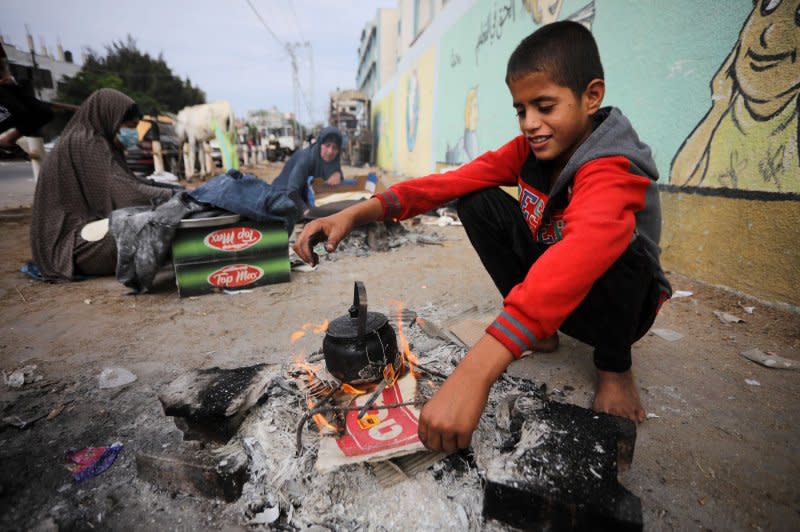U.N. General Assembly adopts non-binding resolution for Gaza 'humanitarian truce' as basic services 'crumbling'

Oct. 27 (UPI) -- The United Nations General Assembly adopted a resolution Friday calling for an immediate "humanitarian truce" to end the ongoing fighting between the Israeli military and Palestinian militant factions.
The non-binding Jordanian-sponsored resolution passed with 120 states voting in favor, 14 voting against and 45 abstentions.
Notably, the United States voted against the resolution.
The resolution calls for the "immediate and unconditional release" of all civilian hostages and for an "immediate, durable and sustained humanitarian truce" between the warring parties.
In response, U.N. Ambassador Gilad Erdan said the world body no longer had "even one ounce of legitimacy or relevance."

In a BBC report, Erdan called the vote for a truce "a dark day for the U.N. and for mankind" and said the day was one "that will go down as infamy."
The UN General Assembly overwhelmingly called for an immediate humanitarian truce between Israel and Hamas.Israeli UN Ambassador Gilad Erdan said the UN no longer held "even one ounce of legitimacy or relevance".The US voted against the resolution but has called for a "humanitarian pause" in Israeli military operations in Gaza.Israel's military on Friday said it was expanding its operations, as its strikes intensified across the Gaza region.Spokesman Daniel Hagari said forces had "increased the attacks in Gaza. The air force widely attacks underground targets and terrorist infrastructure, very significantly".He again told Gaza residents to move further south.Israel has been bombing Gaza since the 7 October Hamas attacks that killed 1,400 people in Israel and saw 229 people taken hostage by Hamas.The UN General Assembly on Friday voted in favour of an immediate truce in Gaza. There were 120 votes in favour, 14 against and 45 abstentions.The resolution - put forward by Jordan on behalf of the Arab group - also condemns all acts of violence against Palestinian and Israeli civilians, including all "terror and indiscriminate attacks".The vote is not legally binding, but carries moral weight due to the universality of the UN's membership.Israel's Ambassador Erdan called it "a dark day for the UN and for mankind," vowing his country would use "every means" in fighting Hamas."Today is a day that will go down as infamy. We have all witnessed that the UN no longer holds even one ounce of legitimacy or relevance," he said.He accused those who voted yes of preferring to support "the defence of Nazi terrorists" instead of Israel.

xxxxx
The head of the United Nations Palestinian relief agency earlier in the day Friday urged a humanitarian cease-fire to ensure aid reaches those in need in Gaza.

UNRWA Commissioner-General Philppe Lazzarini said a "meaningful and uninterrupted flow" of aid is needed to prevent loss of life as "basic services are crumbling in Gaza."
"As we speak, people in Gaza are dying. They are dying only from bombs and strikes. Soon, many more will die from the consequences of siege imposed on the Gaza Strip," he said.

Lazzarini warned that supplies of medicine, food and water are running out and that Gaza is "on the brink of a massive health hazard as the risks of diseases are looming" after the streets "have started overflowing with sewage."
Several convoys carrying water, food and medicine have gotten in through Egypt's Rafah crossing, but the aid allowed in so far is a trickle of what normally flows in to supply Gaza's roughly 2.3 million people and no fuel is being allowed in.

"These few trucks are noting more than crumbs that will not make a difference for 2 million people," Lazzarini said,
Speaking from Jerusalem, Lynn Hastings, the U.N.'s top humanitarian official in the West Bank and Gaza Strip, said in normal times more than 780 trucks with fuel would have gone into Gaza since Oct. 7, when a Hamas attack on Israel sparked the most recent fighting.

She added that due to the lack of fuel deliveries, UNRWA has been forced to rely on a sole fuel pump near the Rafah border, with supply dwindling as access to even that source has been "sporadic."
Bakeries will soon be only able to break bread for a million people for another 11 days as they ration fuel. Water desalination plants face the risk of going off line, Hastings warned.
Additionally, Hastings said raw sewage pumping will become impossible "whether it's tomorrow or Monday," leaving wastewater to flow into the streets.
"All humanitarian assistance and humanitarian issues have to be unconditional," including the release of 224 hostages held in Gaza and the transport of aid for those in the Gaza Strip, she said.
U.N. World Food Program representative Samer Abdeljaber said civilians in Gaza say conditions are "a nightmare -- and we have no way to wake up from it."
Israel imposed the siege on Gaza and began bombing after Hamas slaughtered 1,400 people in Oct. 7 attacks on Israeli civilian settlements near the Gaza border.


